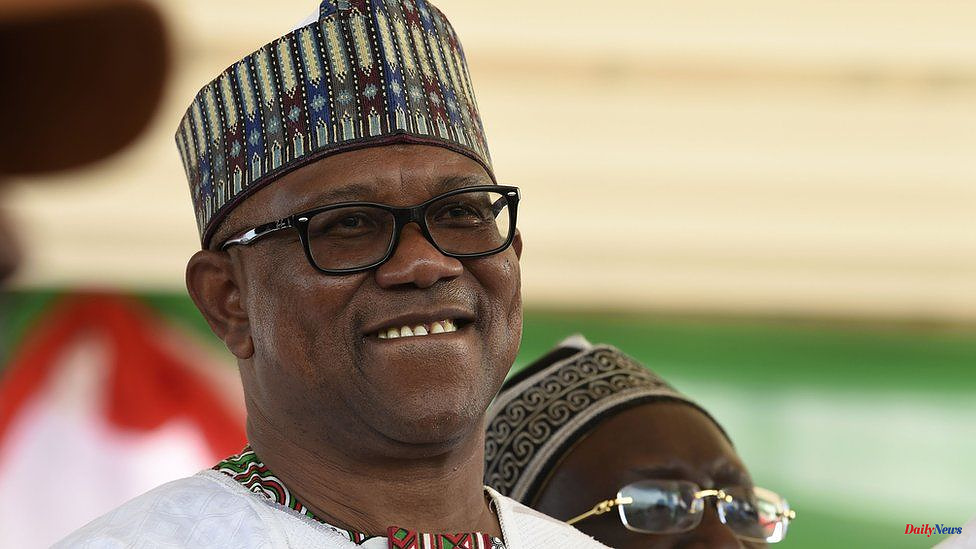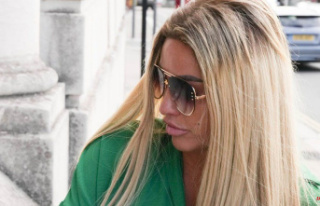Peter Obi is a wealthy businessman who has a reputation as being frugal. He is expected to emerge as a strong force in Nigeria's presidential elections next February. His messages of prudence, accountability and energisation are amplified through the support of an army of social media users.
Young social media-savvy supporters of Obi have raised Obi to sainthood in a country that is always on the lookout to find a Messiah to solve its many problems. They are supporting his Labour Party, which is largely unknown, against two septuagenarian political heavyweights.
His name is frequently trending on social media due to numerous conversations sparked from his supporters. This makes it easy for his supporters to instantly recognise him through their display photo of him or the white, green, and red logos of his party.
They are mostly urban under-30s and refer to themselves as "Coconut-head Generation" because they are independent-minded, strong-willed, and disapprove of older politicians who they claim have done little for them.
Many of them, including Dayo Ekundayo, from Owerri in the east, were involved with the EndSars protests, which forced the dissolution of a notorious police force two years ago. This also led to calls for better government.
They are now using the same strategies that mobilized thousands of young Nigerians, and raised millions of Naira in just weeks for the 60 year-old who they see as an alternative to the two main parties that have dominated politics ever since 1999's end of military rule.
"Which Nigerian politician is the only one who has held office in Nigeria and still has integrity?" "I don't see any other option for young Nigerians," stated Mr Ekundayo.
He was involved in the march for Mr Obi and will be providing logistical support and mobilizing students, just as he did during EndSars protests.
Opponents claim that Mr Obi is a political fraud, one of many who appear to be a third force and will take power away from the traditional parties at election time.
Many people who support the opposition People's Democratic Party, (PDP), and neutral observers agree that he is the best candidate. However, they say he lacks the national popularity necessary to win the election. They warn his supporters that they could lose their votes.
They fear he could distract from their common goal to remove the ruling All Progressives Congress from office and could split the opposition vote.
They point out that he is a devout Catholic hailing from eastern Nigeria. His popularity in the Muslim-dominated North, whose votes are crucial in winning presidential elections, is also a problem.
His critics wonder if he is truly a break from corruption that he routinely lambasted. They point out that his name was in the leaked Pandora Papers, which revealed the hidden wealth of the powerful and rich in 2021.
Although he wasn't accused of theft, he didn't declare any offshore assets or assets owned by his family, citing ignorance.
He was also accused in a case of investing state funds as governor into a company with which he had dealts. He denied any wrongdoing, and pointed out that the investment's value has increased since then.
Obi has repeatedly stated that he doesn't want to be president. This is odd for someone who has switched parties four times since 2002.
He quit the PDP days before the party's May presidential primary. The party then elected Atiku Abubakar, a former Vice-President of the PDP, as its presidential flagbearer.
Critics claim he pulled out because he was not certain he would win. However, he mentioned wrangling in the PDP (where he was a vice presidential candidate in 2019) as the reason he decided to join the Labour Party.
His supporters believe he was forced out of the PDP by refusing to bribe party delegates at the primary. They have also coined the phrase "We don’t give shishi" to describe his famed thriftiness and his prudent management of government funds in a country that has a history of excessive spending by public officials.
They see him as an unconventional politician, ready to face the APC-PDP behemoths they view as two sides of the same coin.
His candidacy also has a religious and ethnic component.
His supporters believe that he will win in a country where half of the population is Christian. After eight years of President Muhammadu Buhari, they don't want any other Muslim to be elected, whether it's Bola Tinubu (70), or Mr Abubakar (70), from the APC.
Many also support Mr Obi due to his ethnicity. The country's third-largest ethnic group is the Igbos. However, Nigeria has only had one Igbo president since 1960 when it was freed from British colonial rule.
Many Igbos believe that successive Nigerian governments have marginalized them. They hope that Mr Obi will rise in power to ensure that the south-east, home to most of them, sees greater development and counter the pull of separatist groups like the Indigenous People of Biafra.
He graduated in philosophy and worked in the family's retail business before deciding to make his own money. He imported everything from beauty products to salad cream and even champagne. He also owned a brewery and held major shares in three commercial banks.
A Nigerian billionaire is usually easy to spot from a distance, but Obi is thrifty and proud to wear it.
He quickly points out that he has only two pairs of black shoes by the British midmarket chain Marks and Spencer. He prefers a $200 suit from Stein Mart over a $4,000 Tom Ford suit and insists on having his own luggage rather than paying someone to do it.
His frugality is not lost on his children. He said that his 30-year-old son was denied car ownership, while his other child is a happy primary teacher, which is rare in a country where politicians are often able to open doors to more lucrative positions.
His tenure as governor in Anambra has been a point of reference for his presidential campaign, despite the financial scandal.
His supporters claim that he made investments in education and paid his employees on time, simple things that many Nigerian governors neglect.
Another rarity was the fact that he left enormous savings in the state coffers at his end of his four-year tenures.
Frances Ogbonnaya was a student at Anambra State University when Mr Obi was governor. She is not surprised that so many praises are being made of him and describes his tenure as "unremarkable."
"Who saves money when there is hunger?" Who saves money when there are no facilities? She asked rhetorically.
His reputation for thrift and sound management has drawn a lot of support, the OBIdients.
Some were accused of cyberbullying, and have called anyone who doesn't vote for them in the next year's elections an enemy of state.
He replied with a tweet asking his followers to "imbibe sportsmanship". However, it did little to calm them.
They quickly show anyone who says elections can't be won on Twitter, the people gathered at Nigeria's electoral office where they are flooding to register to vote.
However, this is not the same thing as actually voting on election day.
There is no doubt that Mr Obi has momentum built up over the months, but cynics point out the absence of a national party structure to support his view that an Obi presidency, although possible, remains highly unlikely.
He responds that his structure is made up of "the 100million Nigerians living in poverty [and] 35 million Nigerians who aren't sure where their next meal will be coming from".
It might be enough to get him elected by half the people who vote for him on election day.












